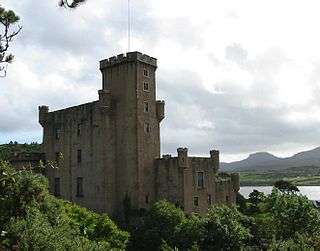Norman MacLeod (British Army officer)
Major-General Norman MacLeod of MacLeod FRS FRSE (1754–1801) was a Scottish soldier and politician, who served as MP for Invernessshire 1790 to 1796. Thomas Pennant called him “unusually intelligent”. As an MP he was one of the early campaigners (1796) to abolish the slave trade.
Life

He was born at Brodie House in Nairn on 4 March 1754 the only son of John MacLeod 19th of MacLeod (clan chief), and his wife Emilia Brodie, daughter of Alexander Brodie (1697-1754). He spent his first 10 years with his mother in Hampshire being tutored privately. He was then sent to live with his grandfather in St Andrews then went to St Andrews University 1769/70 but removed due to a “sexual escapade” and then went to University College, Oxford in 1770.[1]
In 1771 following a cattle plague in his family home of Dunvegan Castle estate on Skye he vowed to return and resolve various difficulties. He joined the British Army and became a Captain in the 71st Foot Regiment in 1775, through connection to Gen Simon Fraser. He sailed with his regiment (and wife) to aid in the colonial war in America, but was captured en route and held prisoner.
He moved to the 73rd Foot (MacLeod's Highlanders) as a Major in 1778. In 1780 he became Lt Colonel in the 2nd Battalion, 42nd Foot (Black Watch) which was renamed the 73rd Foot in 1786.[2] He served as a Brevet Colonel in the East Indies from 1782 to 1794, fighting against Tipu Sultan then in the Malabar region in India where he was second in command. He reached the rank of Major General in 1794 on a salary of £6000 per year.[1]
In 1790 (during a return to Britain) he was elected a Fellow of the Royal Society of Edinburgh. His proposers were John Hill (his uncle), Andrew Duncan, and James Hutton. He was elected a Fellow of the Royal Society of London the following year.[3] As an MP in February 1792 he voted against war with France. In April 1793 he voted for the relief of Scottish Catholics. In 1794 he was accused of embezzling money whilst in India and never recovered from this accusation.[1]
Financially ruined in 1796 he abandoned political life and turned to drink.
He died on the island of Guernsey on 16 April 1801 whilst preparing for a cruise to restore his health. He left debts of £33,000 a fortune at that time.
Family
In April 1776 he married Mary MacKenzie of Suddie on the Black Isle. She died in February 1784 an event which mentally scarred him for the rest of his life, and he then married Sarah Stackhouse, a noted beauty. They had 3 sons and 4 daughters.[4]
References
- "MACLEOD, Norman (1754-1801), of Dunvegan Castle, Skye, Inverness. | History of Parliament Online". www.historyofparliamentonline.org.
- "Biographies of the Officers of the 42nd or Royal Highland Regiment During the American War for Independence, 1775-1783" (PDF). docs.wixstatic.com. Retrieved 2020-03-14.
- Biographical Index of Former Fellows of the Royal Society of Edinburgh 1783–2002 (PDF). The Royal Society of Edinburgh. July 2006. ISBN 0 902 198 84 X. Archived from the original (PDF) on 2016-03-04. Retrieved 2017-07-29.
- "Major General Norman Macleod, 20th of Macleod". geni.com.